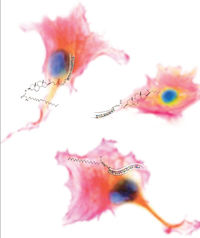New Data for Achillion's Elvucitabine Demonstrate Drug's Safety, Efficacy and Suitability for Combination Therapy
Advertisement
Achillion Pharmaceuticals, Inc. announced positive safety and efficacy results from two ongoing Phase 2 clinical trials studying elvucitabine in patients infected with Human immunodeficiency Virus (HIV). Elvucitabine, Achillion's HIV product candidate, is an L-cytosine nucleoside analog reverse transcriptase inhibitor (NRTI) that has previously demonstrated potent antiviral activity against HIV, including strains resistant to other NRTIs.
The objectives of these trials include demonstration of the safety, tolerability and antiviral activity with a 10 mg dose of elvucitabine, as compared to 3TC (lamivudine), in a standard triple-combination regimen in two distinct patient populations: treatment-naive patients and treatment-experienced patients, particularly those harboring the M184V mutation in the reverse transcriptase protein of HIV.
In the first trial, results at 24 weeks in treatment-naive patients demonstrated that elvucitabine had a potent anti-viral effect similar to 3TC, with a mean change in HIV-RNA from base-line in the elvucitabine treatment group of -3.0 log10 (+/- 0.6) vs. -3.2 log10 (+/- 0.5) in the 3TC treatment group. In the elvucitabine-treated group, 96% of patients reached undetectable viral load, defined as achieving fewer than 50 copies/ml after 24 weeks of therapy, compared to 94% in 3TC group. Elvucitabine was well-tolerated and demonstrated a safety profile comparable to 3TC for both incidence and severity adverse events. Additional results from this trial at both 48 and 96 weeks will be announced as available, and full 24-week data will be presented at a future scientific forum.
The second trial, designed to provide insight into elvucitabine's ability to address difficult-to-treat patients harboring the M184V mutation, included a first phase consisting of exploratory viral kinetic and pharmacokinetic analysis, followed by an open label extension phase. After 14 days of therapy, the Company noted similar viral load reductions in the elvucitabine and 3TC treatment groups. Importantly, however, the trial results demonstrate significant improvement in response in the second open-label extension phase where 8 of 14 patients who received elvucitabine, or 57%, had achieved 0.5 log10 reduction or more in viral load, likely related to the fact that elvucitabine reaches steady-state levels in patients after approximately 21 days of treatment. These data will be presented at a future scientific forum.






















































